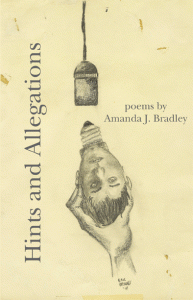 Hints and Allegations, Poems by Amanda J. Bradley. NYQ Books. New York, 2009. 74 pages. $14.95.
Hints and Allegations, Poems by Amanda J. Bradley. NYQ Books. New York, 2009. 74 pages. $14.95.
The feisty and assertive nature of the unnamed protagonist in many of Amanda J. Bradley’s poems is as compelling and well-defined as a novelist’s. The apparently autobiographical rendering of an emotional breakup serves to structure the book thematically, if not chronologically, offering as well a traditional subject from which the poet experiments with diverse poetic forms, making the experience of consuming the book at one sitting all the more enjoyable.
Bradley begins Hints and Allegations with quotes from Emily Dickinson, “Much Madness is divinest Sense–”; George Orwell, “Perhaps a lunatic was simply a minority of one”; and Stephen Stills, “Nobody’s right if everybody’s wrong.” These lines prepare the reader for the brave disobedience inherent in the poems that comprise “Disturbance,” the first of two sections.
“Alert” asserts, “Remain bold if embarrassed…. / I will not tell the authorities…. / who are they to me / but prickless—mindless, / spurring, sparring masters.” The speaker takes no truck with anyone attempting to “master” her, and in “Desert” she clarifies that although “I thought I’d desire you as long / as the desert desires a drink… / I am no longer thirsty. / I am arid.” In this brilliant conceit, not a word is wasted, every image shunted toward the metaphor revealing her revelation.
Another tour de force, “Unscathed,” defends the decision to write in lieu of having a baby: “A writer has an enormous head, like a baby / Tearing through a vagina: both makers of original memories.”
The book’s second section, “Equilibrium,” offers hard-headed obstinacy to being cowed or marginalized: “She is Mae West. / She beats them to the punch, / Coaxes them inside out; they are her fools” (“Her Quilt”).
Humility and awe accompany the speaker’s stance, as “Anticipation” concludes, “May we never know. May we / always wonder. May we remain.” “Any One” enforces the boundaries of knowledge one can never breach: “Besides, if we’ve learned anything, / isn’t it that truth can only be approached, / never reached….”
The poems’ varied forms, from the formal sonnet, “Turn,” to long-lined free verse “Prostration,” compound the reader’s enjoyment—and attention. In ranging so widely, however, not all of her experiments work. “Prostration,” for example, though offered as a poem, reads like a flash fiction: “You wanted me to be more / of a girl, fawning, cuddling, quietly in awe of you…”. “Plates” limps along, one of many other pastiches recently published that imitate a text message or email: “B READY / B LUCID 2 / SWEET 36 / NY MAGIC 2 / BIGUP2BK…”. Other poems, like “O Try 2,” shun specific sense imagery, setting, character and conflict, relying on generalizations Orwell would have eschewed: “what the thieves took / what silenced you / what conviction I lack / what postmodern is…”.
As a whole, however, Hints and Allegations stirs an emotional and intellectual response, hails its speaker as a hero because she confronts her losses and failings with a rebellious determination to survive intact, all the while understanding how little she understands. Courage, risk and fortitude can be found in Bradley’s character and poetry alike.